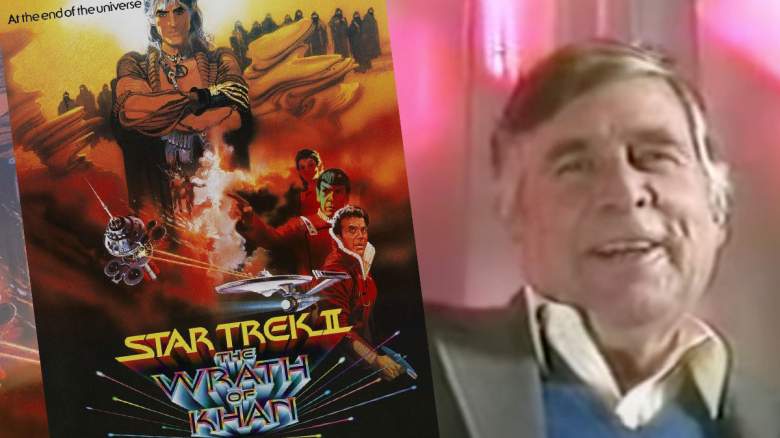
Paramount Gene Roddenberry and ‘The Wrath of Khan’
It was the film that really brought “Star Trek” back. Some might say that Trek was already back, thanks to “The Motion Picture.” But even the actors who were a part of the film would say that was not true.
When Trek creator Gene Roddenberry explained to Leonard Nimoy what Spock would be doing in “The Motion Picture,” the actor said, “I couldn’t figure out why I’d want to go to a movie and see that, let alone play it.”
Nimoy said that and much more in William Shatner’s 1994 book, “Star Trek Movie Memories.” Shatner also had choice words about the plot and script for the big “comeback” for Trek. Thanks to the fluid state of the story, Shatner and the rest of the cast had to learn new lines of dialog minutes before they were expected on the set.
“Script revisions, sometimes arriving as late as 30 minutes prior to the start of the day’s shooting, began coming in on a daily basis,” Shatner wrote in “Movie Memories.” “And whether signed off with an H.L. (writer Harold Livingston) or G.R. (Roddenberry), it was obvious that the continual interoffice creative clashes were beginning to hurt the film.”
The result was a slow-moving film, which Cinema Blend and many others have since called “The Motionless Picture.” Though TMP made money, it was not the hit that Paramount wanted. So Trek got a second chance — this was “Star Trek II: The Wrath of Khan.” Reviews were much better, and even The New York Times said that “this is like it.” Even CBR ranks “Wrath” just a bit behind the “Star Wars” classic, “The Empire Strikes Back,” which is high praise.
The Wrath of Khan
But even though audiences were thrilled with what became the most significant “Star Trek” film of them all, some said that the Trek creator was not pleased with the film’s tone or successes.
Roddenberry was upset that he had been replaced as the film’s primary producer by Paramount. Harve Bennett, a former TV guy who had been behind the hits “The Six Million Dollar Man” and other shows, was chosen to right the Trek ship. Bennet was in charge because Paramount wanted a hit, and they didn’t want to spend as much as they did on “The Motion Picture.”
Writer Jack Klause noted when Roddenberry read over “The Wrath of Khan” script, “he was livid.” Klause said that Roddenberry thought that Bennett was attempting to militarize “Star Trek.” Roddenberry also did not like the violence which took place throughout the film.
Roddenberry May Have Leaked Spock’s Death
Thanks to writer Mike Reyes, who summarized what happened back in 1981-82, fans have a pretty good picture of this part of the story. According to Reyes, many thought that Roddenberry leaked the death of Spock, which sparked a letter-writing campaign by angry fans. Thanks to the wit of director Nicholas Meyer, the film started off with Spock’s death during the Kobayashi Maru testing scene. Meyer incorporated a few scripts together to form the basis for the “Wrath” story, and Spock’s death was a part of one of those.
The Creator Hated the Eels
According to the hosts of the Inglorious Treksperts podcast, Mark A. Altman and Daren Dochterman, Roddenberry disliked the scene where Kirk killed the Celi Eel as it left the ear of Chekov (Walter Koenig). In an interview with SyFy Wire, Dochterman said that a character on “Star Trek” should not “go out of their way to destroy a life form.”
Roddenberry didn’t like the Genesis Technology
In a famous memo to Bennett, Roddenberry said that he disliked the technology dreamed up for the film. Roddenberry wrote:
“I know you will be getting some science advice soon, but I have serious doubts that any science advisor can change the way the universe works.”
In essence, Roddenberry did not believe there was enough science behind the Genesis Torpedo and Effect to have it make sense to audiences. Roddenberry also thought that Federation scientists would have certainly found hundreds of Class-M planets to settle human life, making the Genesis Experiment pointless.
Roddenberry didn’t like Kirk’s Son, David
Played by Merritt Butrick, David Marcus was a character that helped show Kirk’s humanity and imperfections. Despite the swashbuckling and bulletproof persona he displayed at “work,” David’s presence revealed that Kirk was capable of making mistakes. He could not figure things out with David’s mother, Dr. Carol Marcus, so he left them alone. Kirk was indeed a 23rd Century deadbeat dad.
While he did not focus on that aspect, Roddenberry did call David an “idiot” and a “hopeless ninny” in the memo.
Fans can decide for themselves this September, as “Wrath” returns to theaters for the film’s 40th anniversary.
READ NEXT: Star Trek: Enterprise’s John Billingsley on Dr. Phlox and Fundraising
Comments
Why Did Gene Roddenberry Dislike ‘The Wrath of Khan’?